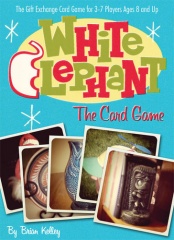White Elephant

Autoren:
Genres:
Spielmechaniken:
Release:
2011
Anzahl der Spieler:
3 bis 7 Spieler
Spielzeit:
15 Minuten
Altersfreigabe:
Frei ab 8 Jahre
Ob das Spiel in Essen erscheinen wird oder doch erst Dezember 2011 bzw. Anfang 2012 steht noch nicht fest!
Some may know the classic White Elephant gift exchange game as Yankee Swap, Dirty Santa, Thieving Secret Santa, or Parcel Pass. The White Elephant Card Game simulates this classic holiday game in a quick, light family card game.
In the White Elephant Card Game you play the part of a no-good cheapskate, unwilling to spend a measly dime on the people on your gift list. However, you will be attending several White Elephant parties. You can take some junk from your attic and exchange it for treasures to give as gifts. If you “play your cards right” you could fill your gift list for free and no one will be the wiser!
Each player has a Gift List Card, a list of three people for whom to acquire gifts. The Gift Cards in their hand constitute their “attic”. There is one “White Elephant Party” for each card in a player’s attic.
For each “party” a player “brings a gift to the party” by placing one Gift Card from their hand facedown on the table in front of them. The first player begins by selecting one of the gifts and “opens” it by turning it face up. The next player may then select a new gift, or “steal” an opened gift by taking a face-up Gift Card from a player who has an open gift. When a player steals an open gift they hold it in their hand until a new gift is opened. This way a gift may be stolen only once until a new card is turned over. When a new card is turned over all stolen gift cards are placed face up so the next player may steal any opened gift.
This continues until the last gift is opened. At this point each player keeps the gift they have and a new party begins. This continues until all of the Gift Cards have been played. At the end of the game each player counts only the one highest-numbered Gift Card they received that matches each color on their gift list. The total of these cards is the player’s final score. The player with the most points wins.

